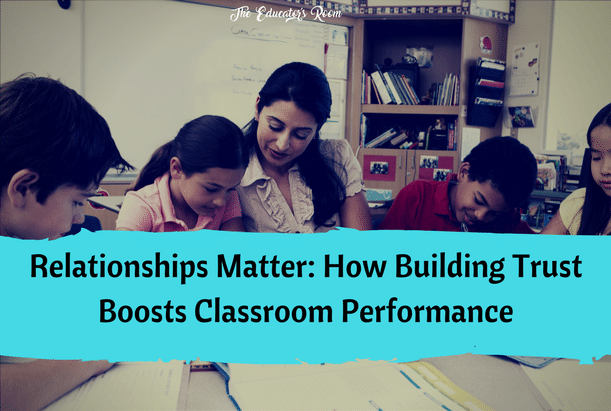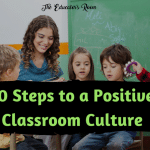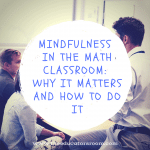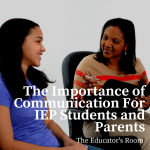No significant learning can occur without a significant relationship.
— James Comer
Take a moment to think about this James Comer quote. No significant learning can occur without a significant relationship. In other words, learning is about relationships. But if that’s the case, we’d better get to work on that, right? Or does that relationship begin to build from day one? Can you change a relationship gone horribly wrong? I’d argue that you can, but you’d better be ready for some hard work and some tongue-biting. School leader Rita Pierson argues in her famous TED Talk that an essential part of our job as teachers is to support, encourage, and build relationships with our students.
[bctt tweet=”Learning is about relationships.” username=”EducatorsRoom”]
What’s in a good relationship?
Have you every read 7 Habits of Highly Effective People? It’s an oldie, but a goodie. I read it last year when I struggled to build relationships with the students I worked with, which means that I, like you, am no expert. But I try. And one of Steven Covey’s most popular quotes is this:
It’s about how you handle when things go wrong
What’s the first thing you do when you believe you see a kid talking or otherwise doing something “wrong” in the classroom? Do you…
- Yell at him or her to stop talking
- Ask what’s going on in a voice that shows you genuinely would like to understand
- Ask what’s going on in an accusatory tone
If you’re seeking first to understand, you start with the second statement. But you’re not perfect and sometimes you get rattled, which is why it’s important to have a thick enough skin to do something else once you initiate a verbal altercation unintentionally. Apologize. And Rita mentions in her video how off-guard students are taken when an adult apologizes to them. You may think that apologizing lowers your credibility in the eyes of the students, but I once had a student thank me for taking responsibility for when I make mistakes. You don’t have to bow down on your knees, but take the moment to come back to the student personally and say, “Hey. I think we both could have handled that better. I’m sorry that I…” and give it time. Don’t always expect immediate results, but be sincere about it at least. It may be a week and you may get a crumpled up letter in your seat, but I guarantee most students will reciprocate.
It’s about how you build self-esteem and achievement
You will have students that hate your class because they’ve never done well in your subject and they think they never will. Building a growth mindset can help with that. So can trust, in fact, Stephen Covey also wrote the following:
The first job of any leader is to inspire trust. Trust is confidence born of two dimensions: character and competence.
Character includes your integrity, motive, and intent with people.
Competence includes your capabilities, skills, results, and track record. Both dimensions are vital.
In fact, let’s go deeper. Covey actually lists 13 behaviors of high-trust leaders worldwide! As it happens, these are all behaviors we can exhibit as leaders in the classroom to develop good relationships. They are as follows;
1. Talk Straight
2. Demonstrate Respect
3. Create Transparency
4. Right Wrongs
5. Show Loyalty
6. Deliver Results
7. Get Better
8. Confront Reality
9. Clarify Expectation
10. Practice Accountability
11. Listen First
12. Keep Commitments
13. Extend Trust
Don’t all students crave teachers who give it to them straight while demonstrating respect, creating transparent expectations, righting what’s wrong, remaining loyal to them (like, attend a game once in a while…), delivering positive results, striving to get better, confronting reality head-on, clarifying expectations (patiently), practicing personal accountability, listening first, keeping commitments (don’t say what you don’t intend to do), and extending trust? What a great guide! If they trust you, when you try to instill a growth mindset, there will be more buy-in, which means more achievement.
It’s about how you show you care
Building relationships with students helps show them that you really care. But you can accomplish showing that you care in probably a thousand different ways. Here is a list of 12 different ways to show you care:
- Go to sports events to watch them play. Events can really build relationships.
- Say “hello” or “good morning/good afternoon” as they come to your door.
- Ask them about their day and listen and ask questions.
- Let them be right, even if you think they’re not, if it’s not that big of a deal.
- Listen when they talk. Really listen. Without doing anything else.
- They like to help. Let them.
- If you have a kid that’s always hungry, find a way to give him/her food.
- Randomly, without prompting, tell them you appreciate them for being themselves.
- Noticing the student is having a bad day? Try asking, “How are you…really?”
- Share their pain when they have it. Hold their proverbial hand, wipe their tears, and be their shoulder to lean on.
- See their potential and encourage them to pursue their dreams.
- Forgive something they did that hurt you without needing to hear the words “I’m sorry.”
It’s like Rita Pierson says, “Every kid needs a champion.” Will you take the time to build relationships in the classroom? Whose champion will you be today?







